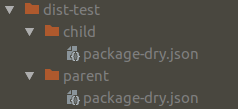README
DRY - Use npm across multiple projects without repeating yourself
Acknowledgements
Fork of https://github.com/Cosium/dry-dry
Get it
$ npm i -g @codemucker/npm-dry
Use it
$ dry init
The copy/paste madness
Because companies and other groups have bunch of package.json attributes that are the same across all npm projects.
Those attributes must be maintained using copy/paste across all projects.
This is wrong !
We believe that those attributes should be easily distributed and updated across projects.
The version management madness
Because most of multi module project use multiple version of the same dependencies. Bundling an application with those modules may be challenging.
Dry provide a mecanism to centralize dependencies version management.
Do not repeat yourself
dry is a stupid npm wrapper allowing any package.json to extend a parent file.
The parent file can be located on the system or simply inside a published npm module.
How does it work
On each dry command, dry:
- creates a merged
package.jsonbased on the providedpackage-dry.json - runs the
npmcommand - applies the possible
package.jsonmodifications made bynpmtopackage-dry.json - removes
package.json
package.json is always removed to make sure that nobody will execute a pure npm command in a dry project.
Inheritance in action

Parent project
package-dry.json
{
"name": "parent",
"version": "1.0.0",
"description": "",
"main": "index.js",
"scripts": {
"test": "echo \"Error: no test specified\" && exit 1",
"foo": "npm help"
},
"keywords": [],
"author": "",
"license": "ISC",
"dependencyManagement": {
"dependency-one": "1.0.0",
"dependency-two": "2.0.0",
"dev-dependency-one": "1.1.0",
"dev-dependency-two": "2.2.0"
}
}
Child project
package-dry.json
{
"name": "child",
"version": "1.0.0",
"description": "",
"main": "index.js",
"scripts": {
"test": "echo \"Error: no test specified\" && exit 1"
},
"keywords": [],
"author": "",
"license": "ISC",
"dry": {
"extends": "parent/package-dry.json",
"dependencies": {
"parent": "1.0.0"
}
},
"dependencies": {
"dependency-one": "managed",
"dependency-three": "1.2.3"
},
"devDependencies": {
"dev-dependency-two": "managed",
"dev-dependency-three": "1.2.3"
}
}
Merged package.json
{
"name": "child",
"version": "1.0.0",
"description": "",
"main": "index.js",
"scripts": {
"test": "echo \"Error: no test specified\" && exit 1",
"foo": "npm help"
},
"keywords": [],
"author": "",
"license": "ISC",
"dependencies": {
"dependency-one": "1.0.0",
"dependency-three": "1.2.3"
},
"devDependencies": {
"dev-dependency-two": "1.1.0",
"dev-dependency-three": "1.2.3"
}
}
package-dry.json
To do that, dry introduces a file named package-dry.json.
package-dry.json replaces package.json in your dry projects.
Of course, it can contain all the attributes of package.json with the addition of an attribute called dry.
package-dry.json dry attribute has 2 optional attributes:
extends- The parent of the current dry packagedependencies- The dependencies needed to resolve the file pointed byextends. Those dependencies will not be saved to your project.
dry commands
dry proxies all received arguments to npm.
Just take your usual npm commands and replace the word npm with dry.
| npm | dry |
|---|---|
| npm init | dry init |
| npm i | dry i |
| npm install | dry install |
| npm publish | dry publish |
| npm x y z | dry x y z |
dry commands : additional parameters
The dry command accepts some additional parameters
- --dry-packager
packager_cli_name: specify the nodejs packager cli to proxy (default :npm, possible values:npm|pnpm|yarn) - --dry-keep-package-json' : when provided the generated
package.jsonfile is not deleted - --dry-save-package-json-to'
target_file_path: when provided a copy of the generatedpackage.jsonfile is done totarget_file_pathlocation
Other handled parameters:
- --loglevel trace|debug|info|warn|error: log set to a specific level
- -s, --silent: --loglevel error
- -q, --quiet: --loglevel warn
- -d: --loglevel info
- -dd, --verbose: --loglevel debug
- -ddd: --loglevel trace
dry : using a custom package manager
Dry use by default npm and it also allows using another package manager like pnpm and yarn trough the parameter --dry-packager.
If you're not using one of the configured packagers or if you need to extend an existing packager then you can provide to
the --dry-packager parameter a path to a 'Package Manager Descriptor' json file.
All package manager available in Dry are defined using a 'Package Manager Descriptor'. It provides to Dry which command it needs to execute and how to handle and map dry supported arguments
{
"extends": "",
"packageManager": "",
"installParentCommandTemplate": "",
"preventPackageJsonChangeFromParentInstall": true|false,
"mappedArguments" : [
{
"arguments": [""],
"expectSubArgument": true|false,
"allowArgInInstallParentCommand": true|false,
"mappedArgumentValues": {
"": [""],
"": [""],
"": [""]
}
},
{
"arguments": [""],
"allowArgInInstallParentCommand": true|false,
"mappedTo" : [""]
}
]
}
DryPackagerDescriptor
| property | description |
|---|---|
| extends | string : If the package manager you plan to use is just a wrapper around another existing one. You can provide his key (npm |
| packageManager | string : The package manager cli name to invoke. Must be available in PATH |
| installParentCommandTemplate | string : the command template to use to install the parent of the current dry package in the node_modules folder. Preferably, this command should not modify the "package.json" file. The command must contains '{0}' which will be replaced by the dependency to install.'{0}' will be replaced by 'parent@0.0.1' or a packed file path 'file://path/to/package.tgz' |
| preventPackageJsonChangeFromParentInstall | boolean : If the command provided in "installParentCommandTemplate" do modify the "package.json" file then turning on this boolean will restore the "package.json" file |
| mappedArguments | ArgumentMapping[]: list of mapped arguments |
ArgumentMapping
| property | description |
|---|---|
| arguments | string[]: Contains the list of handled arguments |
| expectSubArgument | boolean : Indicate if the provided arguments expect an associated value. If 'false' then 'mappedTo' must be provided. If 'true' then 'mappedArgumentValues' must be provided |
| allowArgInInstallParentCommand | boolean : Indicate if the mapping result can also be added to the "installParentCommandTemplate" |
| mappedTo | string[]: The argument provided as input will be replaced by this list of argument as output |
| mappedArgumentValues | Map<string, string[]> : The argument value provided as input will be used as key for this map to get the map value and return the value as the list of argument to output |
You can check current descriptors with the links below:
